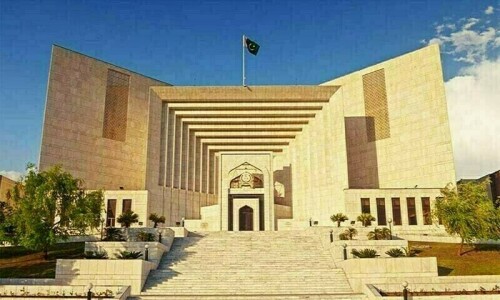THE authorities have started to fence the 900-kilometre border with Iran in Balochistan. I was recently in Mashkhel, a remote border town in western Balochistan’s impoverished Washuk district, to take a first-hand look at Pakistan-Iran trade.
The purpose of my visit was to educate myself about the measures that can be taken to improve the lot of people living on the Pakistan side of the border as they are dependent on bilateral trade and are the ultimate sufferers when the government steps in to restrict trade by invoking the US sanctions against Iran.
Mashkhel’s assistant commissioner accompanied me on the trip. The distance between Mashkhel town and the border is about 20 kilometres.
As the road is unmetalled, it takes almost 25 minutes to get to the border point. But I became uneasy as we didn’t reach our destination even after an hour.
“Isn’t it (20 km) taking too much time?” I asked Hameed, the local Levies man in the driver’s seat. After the question, he broke his silence: “I think we have lost our route.”
His brief answers to my queries gave me an idea of how the authorities discourage trade with Iran.
We decided to return to Mashkhel as we were running out of fuel. The assistant commissioner took out his frustration on Hameed, the driver, saying that the ‘rahbalad’ (the man who knows the route) had “let us down”.
As Balochistan is underdeveloped, there is an increasing trade imbalance with Iran. The federal government has of late started taking some interest in bilateral trade and opened points for exchange of goods in Makran division. “Balochistan is heavily dependent on food items from Iran, which come through the land border,” points out Asif Baloch, the editor of Azadi, an Urdu daily.
“Iranian items are available even in Quetta, which is far from the border with Iran.”
Islamabad and Tehran opened the Pishin-Mand border crossing point in Kech district last month for facilitating traders.
The present government, like its predecessors, talks of increasing the trade volume with Iran by establishing border markets. But the ground realities speak otherwise.
A Quetta-based official sums up the apathy in one word: sanctions.
Badruddin Kakar, who is senior vice president of the Quetta Chamber of Commerce, put it bluntly: “The business community has been given no facilities for exporting goods to, or importing them from, Iran.
“The authorities do not bother about the matter. Our exports, in particular, are ridiculously low.”
Iranian officials stationed in Quetta have always supported the expansion of bilateral trade, expressing confidence that the volume can be raised from $1 billion to $5bn.
They have even offered to provide electricity to major parts of Balochistan.
Beneficiaries have no say
The biggest potential beneficiary of Pakistan-Iran trade will certainly be the local populace. But unfortunately they do not have a say in decision-making. Their voices go unheard.
“Unlike representatives of the other provinces in the National Assembly, those from Balochistan are purely politicians. From other provinces businessmen too are elected along with politicians,” Mr Kakar observed.
The border trade points operate only three days in a week. The three days see an endless flow of Iranian items being brought in, but the flow in the other direction is negligible.
“The balance of trade is tilted heavily in Iran’s favour. Our items are mostly exported by sea via Dubai,” Mr Kakar added.
He is right in many ways. People living in Quetta are hardly aware of the hurdles in trade with Iran. Locals like Hameed from Mashkhel have no idea of the road leading to the border.
So what can one expect of the authorities sitting in Islamabad?
Published in Dawn, May 16th, 2021















































